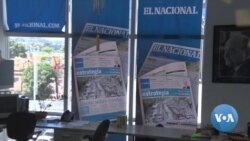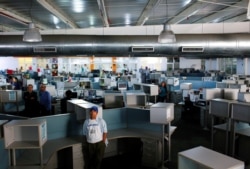CARACAS — The president of Venezuela's National Assembly is vowing to convert what was once the country's largest independent newsroom into a state-financed communications college.
Speaker Diosdado Cabello, a top lieutenant to President Nicolas Maduro, successfully sued Venezuela's El Nacional for defamation in 2015, shortly after the storied national newspaper republished an article from Madrid-based ABC reporting that Cabello was under investigation by U.S. authorities for drug trafficking.
Denying any involvement in the narcotics trade, Cabello filed suits in Venezuela and abroad, arguing that publications such as the U.S.-based Wall Street Journal lacked proof against him, and that their reports sought only to impugn his character.
U.S. courts dismissed Cabello's defamation suit, but in June 2018, one month after the U.S. Treasury sanctioned Cabello for organizing drug shipments from Venezuela to Europe, freezing his assets and imposing a travel ban, a Caracas tribunal ordered El Nacional to pay what could amount to hundreds of millions in damages to Cabello for libel over the 2015 story.
Maduro announced the establishment of a communications and journalism university in a televised presidential decree last week, and Cabello took to the airwaves to announce its location.
"As soon as I have the ruling and they tell me where I have to sign, I will give the building to the University of Communications," Cabello said.
Ongoing struggle
Founded in August of 1943, El Nacional, which once employed roughly 2,000 people companywide, halted its print publication in May 2018 after currency controls levied by Maduro's government starved the newsroom's 20 remaining journalists of newsprint, ink and printing equipment.
The paper's lawyer, Juan Garanton, who already has moved to appeal the tribunal ruling, said he was puzzled by Cabello's latest statement.
"I really don't understand why he intends to take over the building," Garanton told VOA. "There are so many empty properties in the country that can be used for a university. Actually, they can fix our existing universities and give them more resources. I see no need to expropriate."
But Miguel Henrique Otero, El Nacional's self-exiled owner and grandson of its founding publisher, told VOA he's not surprised.
"It's not the first time Diosdado Cabello threatened to take the building of El Nacional," Otero told VOA from his home in Madrid, where he continues to operate the publication online, albeit with drastically reduced staff and a shoestring budget. "He made the same comments before the lawsuit."
Because Venezuelan commercial law gives tribunals the rights to seize assets for auction if a company can't pay a court-ordered fine, he thinks Cabello is waiting for the tribunal to nix the appeal and levy a fine beyond El Nacional's market value, forcing a court seizure of the building as collateral.
'Silencing freedom of opinion'
Edgar Cardenas of Caracas' National Association of Journalists, however, said Cabello's vow to physically commandeer the newsroom is not unique, and has nothing to do with rule of law. He told VOA it is just one of "many different ways" the politically embattled Maduro regime cows independent journalists and critics into submission.
"Direct persecution, opening judicial cases, direct attacks on journalists, media sanctions, censorship, closing radio programs," he said. "This is all evidence of an attempt to continue silencing freedom of opinion, freedom of expression."
While pro-government newspapers like Ultimas Noticias operate freely in Venezuela, El Nacional's hard-hitting reports on power cuts, allegations of electoral fraud, and strikes by desperate workers have often placed it in the crosshairs of Maduro's ruling Socialist party, prompting senior government leaders to single out its coverage for public criticism.
The Venezuelan National College of Journalism recently reported more than 1,000 violations of press freedom in 2019.
In its 2019 annual World Press Freedom Index, Paris-based Reporters Without Borders ranks Venezuela 148 out of 180 countries, in which 1 is considered most free.
This story originated in VOA's Spanish Service.






